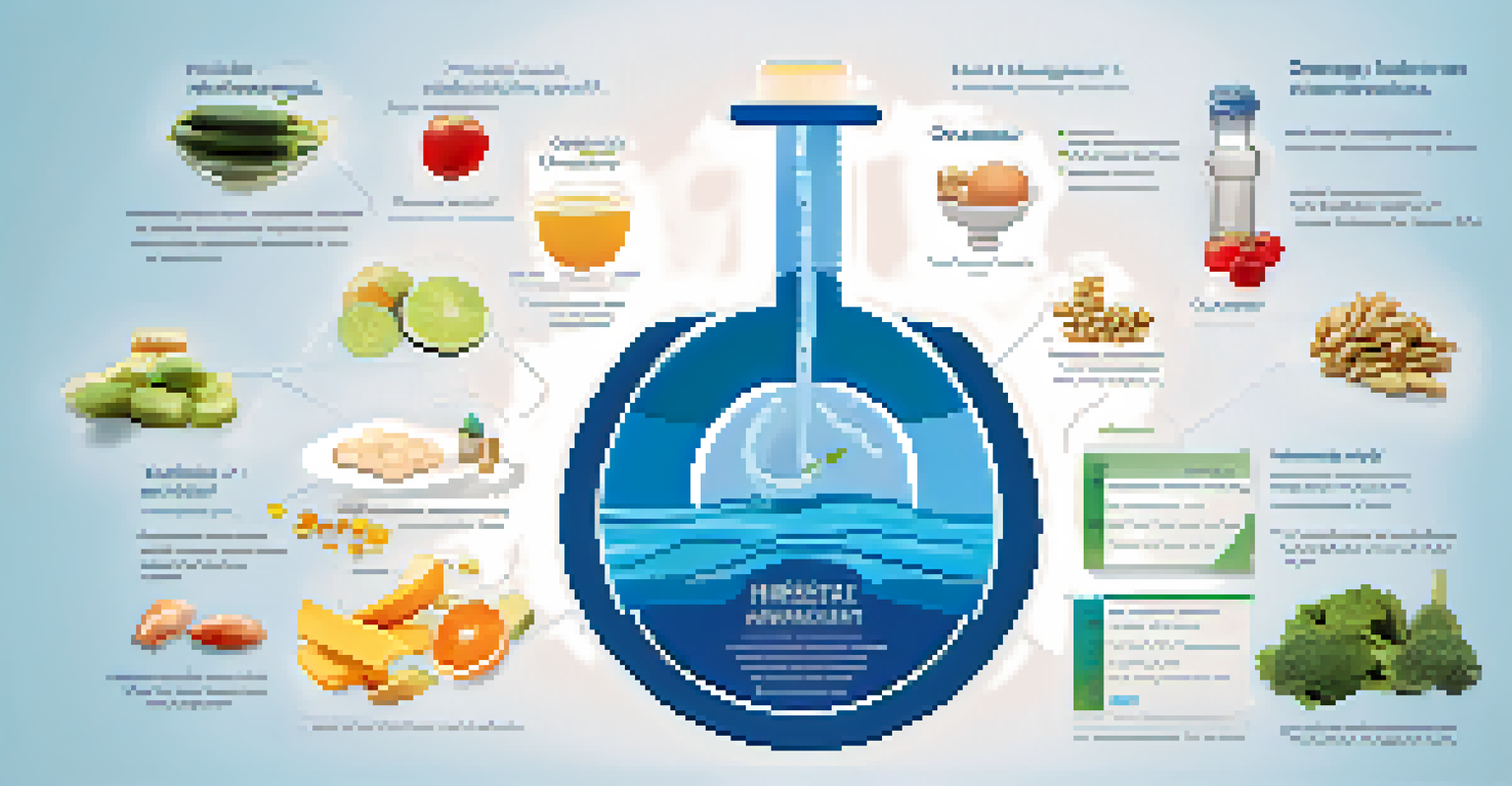The Role of Nutrition in Managing Chronic Pain Conditions

What Are Chronic Pain Conditions and Their Impact?
Chronic pain conditions, such as arthritis or fibromyalgia, affect millions worldwide, often leading to daily struggles. These conditions can stem from various sources, including injury, genetics, or inflammation. Living with chronic pain can drastically reduce quality of life, affecting everything from mobility to mental health.
The food you eat can either be the safest and most powerful form of medicine or the slowest form of poison.
For many, pain management becomes a multifaceted approach that includes medication, physical therapy, and lifestyle changes. However, an often-overlooked aspect is nutrition, which plays a vital role in how our bodies respond to pain. Understanding the link between what we eat and chronic pain can empower individuals to take control of their health.
By making informed dietary choices, individuals may find relief from their symptoms. Nutrition can influence inflammation levels, energy production, and overall well-being, making it an essential component of chronic pain management.
The Connection Between Inflammation and Nutrition
Inflammation is a key player in many chronic pain conditions, often exacerbating symptoms. Certain foods can either promote or reduce inflammation in the body. For example, processed foods high in sugars and unhealthy fats can trigger inflammatory responses, while fruits, vegetables, and whole grains can help combat them.

Incorporating anti-inflammatory foods into your diet might help alleviate pain. Think of it this way: your body is like a garden, and what you feed it can either nourish it or allow weeds to grow. By choosing the right foods, you can create a healthier environment that supports pain management.
Nutrition Affects Chronic Pain
Making informed dietary choices can significantly influence inflammation and overall pain management.
Some popular anti-inflammatory options include fatty fish, leafy greens, nuts, and berries. Not only do these foods provide essential nutrients, but they also contribute to reducing overall inflammation, helping you feel better over time.
Essential Nutrients for Pain Management
Various nutrients play specific roles in pain management, making it crucial to include a diverse range of foods in your diet. Omega-3 fatty acids, found in fish and flaxseeds, are known for their anti-inflammatory properties. Similarly, vitamin D and magnesium can help modulate pain perception and improve muscle function.
Let food be thy medicine and medicine be thy food.
Additionally, antioxidants found in colorful fruits and vegetables help combat oxidative stress, which can worsen pain. Imagine your body as a car; just as you need quality fuel to run smoothly, your body requires the right nutrients for optimal performance and pain relief.
Furthermore, staying hydrated is essential. Water helps transport nutrients throughout your body and aids in the elimination of toxins, both of which can contribute to reduced pain levels.
The Role of a Balanced Diet in Pain Relief
A balanced diet is not just about eating the right foods; it’s about finding the right balance for your individual needs. This means paying attention to portion sizes and ensuring you’re getting all the necessary nutrients. Think of a well-rounded plate as a team working together for your health.
Incorporating a variety of food groups can help prevent nutrient deficiencies that might exacerbate pain conditions. For instance, whole grains provide energy while supporting digestive health, which is vital for overall well-being. Each food group has its strengths, much like players on a sports team.
Essential Nutrients for Relief
Incorporating a variety of nutrients, such as omega-3 fatty acids and antioxidants, is crucial for effective pain management.
By focusing on whole, minimally processed foods, you can create a solid foundation for managing chronic pain. It’s about building healthy habits that contribute to long-term relief rather than seeking quick fixes.
Mindful Eating: A Key Practice for Pain Management
Mindful eating is a practice that encourages you to slow down and pay attention to your food choices, which can be particularly beneficial for those managing chronic pain. When you eat mindfully, you become more aware of how certain foods affect your body and pain levels. This awareness can help you make more informed dietary choices.
Consider taking a moment to appreciate the colors, textures, and flavors of your food. This simple act can enhance your dining experience and promote better digestion, which may lead to reduced discomfort. Just as tuning into your body helps with pain awareness, it can also guide you toward healthier eating habits.
Mindful eating can also help combat emotional eating, which often occurs in response to pain. By recognizing your emotions and their connection to your hunger, you can develop a healthier relationship with food.
Supplements: Are They Necessary for Pain Management?
While a balanced diet is foundational, some individuals may find it challenging to get all the necessary nutrients from food alone. In such cases, supplements can play a supportive role in pain management. However, it's essential to approach supplementation with caution and ideally under the guidance of a healthcare professional.
For example, omega-3 supplements can be beneficial for those who don't consume enough fatty fish. Similarly, vitamin D supplements may be necessary for individuals with limited sun exposure. Think of supplements as a safety net, filling in the gaps when your diet may fall short.
Team Up with Healthcare Pros
Collaborating with healthcare professionals can provide personalized nutrition strategies for better pain management outcomes.
Always remember that supplements are not a replacement for healthy eating. They should complement a well-rounded diet, helping you achieve balanced nutrition and potentially reducing pain.
Collaboration with Healthcare Professionals for Better Outcomes
Managing chronic pain through nutrition is most effective when approached as a team effort. Collaborating with healthcare professionals, such as dietitians or pain specialists, can provide personalized guidance tailored to your specific needs. Just like a coach helps athletes achieve their best performance, professionals can help you navigate your dietary choices.
Tracking your food intake and pain levels can also provide valuable insights to share with your healthcare team. This information can help them identify patterns and make more informed recommendations. Think of it as gathering data to devise a winning strategy for your pain management.

By working together with your healthcare team, you can create a comprehensive plan that incorporates nutrition, lifestyle changes, and medical interventions, ultimately leading to better pain management and improved quality of life.